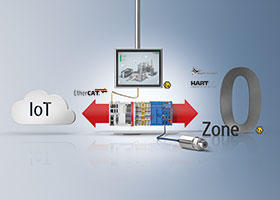

Progress is not based on the innovative creation of buzzwords. Unfortunately, the development of enabling technologies in recent decades did not help to raise process automation to an advanced level. Therefore, the question we should ask is: How can we build a suitable foundation for future innovations without violating the process industry’s demanding requirements regarding equipment availability and ease of use?
In my years as a user of applications, I often saw the reservations that automation engineers had when trying to adapt new technologies for use in the process industry. There are good reasons for this attitude, particularly in the oil and gas industry. The desire of operators to protect availability at all costs by implementing new technologies later, or rather not at all, is often referred to as the ‘race to be second’.
From a user’s standpoint, there are good reasons for not being the first to implement an innovation. After all, the pressure to deliver is immense, because the market expects a permanent supply of resources. This means that the risks of implementing new technologies are difficult to assess and predict with regard to financial feasibility, safety and environmental concerns, which is why process automation designers have developed a healthy scepticism towards new technologies. They don’t trust buzzword-driven marketing campaigns and believe that suppliers often don’t think in terms of actual applicability.
Only advanced technologies create real capacity for innovation
These constraints, which are based on real market requirements, cannot be ignored. On the other hand, the need to innovate is increasing noticeably due to a changing market environment. Where projects used to be planned in terms of years, today’s schedules are set in terms of months, sometimes even weeks.
As a result, we are seeing a steadily increasing interest on the user side to evaluate new technologies intensively and develop suitable applications. The aim is to achieve improvements along the entire value chain by utilising the potential of modern technologies in practice-oriented optimisation approaches.
As a supplier of PC-based control technologies, Beckhoff enables its partners to seamlessly combine the DCS and IT levels. The expertise of system operators is often contained in proprietary software that requires the use of IT components. Today, on virtually every oil and gas platform I visit, I keep seeing desktop PCs that run the software for calculating drill process algorithms. And the downstream control systems are no different. Since the software mentioned above cannot be installed on conventional automation systems, operators frequently resort to using hardware that was not designed for such applications and put the availability of their equipment at risk due to the lack of suitable alternatives.
Powerful industrial PCs combine two worlds
Powerful and robust industrial PCs from Beckhoff provide a solution for this problem because they can handle both the automation tasks of the DCS, and all IT-level functions. As a result, operators can increase the total availability of systems and reduce the engineering effort.
Another benefit of PC-based control technology is the ease with which open interfaces such as OPC UA can be integrated and data exchanged across systems. This openness in turn is a prerequisite for being able to select necessary components according to their technical suitability and not merely based on their compatibility.
This approach also makes it possible to implement the current trend towards more modularity in automation. All these developments will help establish open automation concepts in the process industry in a sustainable manner. In addition, the new level of openness and modularity will enable mid-sized specialty companies to seamlessly integrate their best-in-class products into existing systems.
Furthermore, PC-based control technology will significantly simplify the integration of robotics, which is playing an increasingly important role in the process industry. Their use can make many process steps more efficient and minimise workplace hazards. The realignment of these operational factors will ultimately make companies more competitive and safeguard jobs.
PC-based control systems have also addressed the major question of IT security. Since they provide the best possible foundation of future automation systems, they will eventually be just as successful in the process industry as they have been for decades now in discrete automation applications. In summary it is safe to say that PC-based control systems are the open automation platform we urgently need in the process industry.
For more information contact Dane Potter, Beckhoff Automation, +27 79 493 2288, [email protected], www.beckhoff.co.za
| Tel: | +27 11 795 2898 |
| Email: | [email protected] |
| www: | www.beckhoff.com |
| Articles: | More information and articles about Beckhoff Automation |

© Technews Publishing (Pty) Ltd | All Rights Reserved